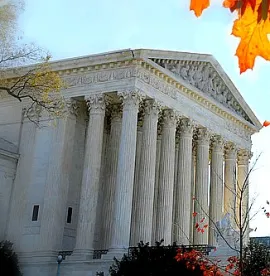Today, the Supreme Court released its decision in Byrd v. United States. The Court held that under the Fourth Amendment, a driver of a rental vehicle can challenge a search of the vehicle even if he is not listed as an authorized driver on the rental agreement.
The case began in September 2014, at a Budget car rental facility in New Jersey. While Terrence Byrd waited outside, Latasha Reed, his partner with whom he shares five children, entered the facility and signed the car rental agreement. The agreement stated that additional drivers would only be allowed “with prior written consent.” Reed did not add any drivers to the agreement. Upon leaving the rental car facility, Reed gave the keys to Byrd, who began driving to Pittsburgh. On the way, Byrd passed a Pennsylvania State Trooper, who was suspicious of Byrd because he was driving with his hands at the “10 and 2” position.
The officer pulled Byrd over for a possible traffic violation. The officer and his partner learned that Byrd was not listed as an authorized driver on the rental agreement, and that Byrd had prior drug and weapons convictions. Byrd told the officers that he had a marijuana cigarette in the car. Without Byrd’s consent, the officers then searched the rental car, where they discovered a bullet-proof jacket and 49 bricks of heroin.
Byrd was charged with possession of heroin with intent to distribute and possession of body armor after a felony conviction for a violent crime. Byrd argued that the evidence obtained in the search could not be used as evidence against him because the troopers lacked probable cause to search the trunk. In response, the government argued that the officers did not need Byrd’s consent because he was not listed as an authorized driver on the rental agreement, and therefore had no expectation of privacy under the Fourth Amendment.
The district court agreed with the government that Byrd did not have had a reasonable expectation of privacy in the car because he was not an authorized driver on the rental car agreement. The Third Circuit affirmed. Neither court decided whether the troopers had probable cause to search the car. On appeal to the Supreme Court, Byrd argued that whether he was on the rental car agreement was irrelevant to whether he had a reasonable expectation of privacy under the Fourth Amendment. Rather, he argued, the relevant question is whether he has “possession and control” over the car—possession and control that he had, as Reed had rented the car and allowed him to drive it.
In a unanimous decision written by Justice Kennedy, the Supreme Court ruled for Byrd. The Court rejected the government’s contention that drivers who are not listed on rental agreements always lack an expectation of privacy in the car, which “rests on too restrictive a view of the Fourth Amendment’s protections.” The Court likewise rejected the government’s argument Byrd lacked a reasonable expectation of privacy based on the rental agreement. “As anyone who has rented a car knows, car-rental agreements are filled with long lists of restrictions,” the Court wrote, including “prohibitions on driving the car on unpaved roads or driving while using a handheld cellphone.” The government conceded that violating provisions like these had nothing to do with a driver’s reasonable expectation of privacy in the rental car, and the Court concluded that “there is no meaningful difference between the authorized-driver provision and the other provisions the Government agrees do not eliminate an expectation of privacy, all of which concern risk allocation between private parties—violators might pay additional fees, lose insurance coverage, or assume liability for damage resulting from the breach.” (This reasoning may be invoked in future cases addressing the relationship between Fourth Amendment rights and Terms of Service.)
In turn, the Court rejected Byrd’s argument that a rental car’s sole occupant always has an expectation of privacy based on mere possession and control. Without qualification, the Court reasoned, Byrd’s rule would include thieves or others who lack a reasonable expectation of privacy.
The Court’s decision expressly grounded the Fourth Amendment’s reasonable expectation of privacy test in “property concepts.” While the Court made clear that property-based understandings of the Fourth Amendment are not always dispositive as to reasonable expectations of privacy, it suggested that where Fourth Amendment standing derives from ownership and possession of property, property-based principles may guide resolution of the reasonable expectations of privacy test. Under property concerpts, legitimate presence on the premises of the place searched, standing alone, is not enough to accord a reasonable expectation of privacy. So too, the right to exclude others is one of the main rights attaching to property, and the one who owns or lawfully possesses or controls property will in all likelihood have a legitimate expectation of privacy by virtue of the right to exclude.
Despite the favorable decision for Byrd, the evidence against him may still be admissible—and his conviction may still be affirmed. The Court remanded the case back to the lower courts to determine two issues. First, whether Byrd still had an expectation of privacy even though he had engaged in “subterfuge” by using Reed to mislead the car rental company; and second, whether, even if Byrd had a right to object to the search, the police otherwise had probable cause for the search.




 />i
/>i
